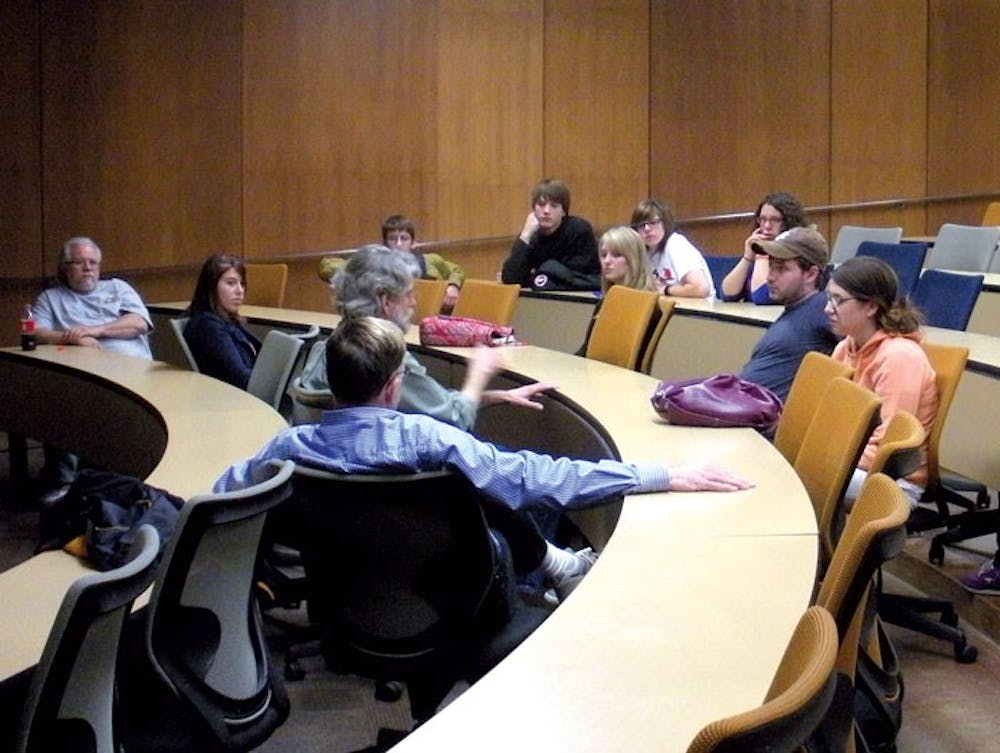
Professors and students discussed activism and awareness at Miami, in an open forum Tuesday evening. (EMILY ESPOSITO | The Miami Student)
Comparative Religion Students Association (CRSA) held a panel Tuesday to discuss the presence and lack of activism on Miami University's campus.
"How many of you are registered to vote?" Professor Rick Momeyer asked.
Of the 15 people in the room, nearly everyone raised their hand.
"How many of you voted?" Momeyer asked.
Only two people raised their hand.
"There's the answer about if activism is dead at Miami," he said. "Participating in the democratic process is not an option. Otherwise, democracy dies."
Momeyer said he grew up in an era of protest. He had friends who died registering people to vote to vote. Now his generation is not giving youth the opportunities for activism, he said.
"Young people are idealistic and hopeful, and then we scare the hell out of you about if anyone is going to pay you to do anything," he said.
The panel focused on the difference between social involvement and social change. While the group said charity work is always good, the panel discussed the importance of a deeper connection.
Miami's Office of Community Engagement and Service has reported a rise in community service participation among students, according to Professor Thomas Dutton.
Enjoy what you're reading?
Signup for our newsletter
"Most people do community service sporadically and feel good about it," Dutton said. "How do we get people more involved?"
He said people need to work together to address the systemic issues that have created the problem in the first place. "Instead of serving at the soup kitchen, we need to ask why we have homeless people all together," Dutton said.
A group of students involved in efforts to help Haiti attended the panel. They said they feel strongly about their issue because they share a connection with the people of Haiti.
"(In) today's culture we are so focused on ourselves," first-year Corey Mollette said. "People are only focused on America, but there are people who have it a lot worse than us."
Senior Kelissa Hieber has participated in the Over-the-Rhine residency program. This program involves 12 students living and working in Over-the-Rhine in Cincinnati, a neighborhood that struggles with homelessness and poverty.
Heiber said people often do not ask why a country is struggling, but instead throw money at the problem.
"There is consistent apathy," she said. "We think someone else will fix it."
Junior Leah Scheucher focused on how attention on activism has turned outward.
"A lot of focus has shifted to international activism," she said. "We push international injustices but have forgone the domestic issues like race, women's rights and sexuality education."
The discussion also focused on how to stimulate involvement.
"What are the concerns that are going to provoke people enough to act?" Assistant Professor Jim Hanges asked. "Have we really solved all the issues?"
Momeyer assured the students their education is important.
"Don't be discouraged that you are not out there changing the world instantly," he said. "You can't make effective change until you understand."
Dutton's two words of advice for students were "join something."
He focused on a Chinese proverb: "A journey of 1,000 miles begins with a single step," Momeyer said. "Find the step that you can take."
The next CRSA meeting will be held Nov. 30.
Talawanda School District Art Teacher Marie Huseman-Lindsey and Miami Univesity Art Museum will team up to present PeaceWorks: Teaching Art for Social Change. The presentation will consist of a 30-minute documentary at 4:30 p.m. Tuesday, Nov. 16 at the Miami Art Museum.
The documentary will share Huseman-Lindsey's dream to create peace throughout the world by teaching the arts. After the documentary presentation, Huseman-Lindsey will explain how her kindergarten through sixth-grade art curriculum at Talawanda has helped children during her 12 years of teaching. A question and answer session will follow. The event is part of the Human Rights and Social Justice Program Center for American and World Cultures at Miami.




